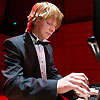Biographical Note
Douglas Gordon Lilburn (born Wanganui, 2 November 1915; died Wellington, 6 June 2001)
Douglas Lilburn occupied a pre-eminent position in New Zealand. Douglas Lilburn's music, from the early nostalgic canzonas to his electoacoustic images, has a strong emotional appeal. It acknowledges the richness of a predominantly European musical heritage while finding a distinctively New Zealand voice. Two published lectures, A Search for Tradition (1946) and A Search for a Language (1969), suggest a conscious balance. What binds both the conservative and innovative elements is personal integrity. Lilburn explained Vaughan Williams's paradoxical advice to 'cut out all the bits you like best' as meaning 'don't be clever, don't be silly, don't try to impress - search for what is valid in your intuition, your understanding, and go from that'.
Lilburn spent his early years on the family sheep station, Drysdale, in the central North Island of New Zealand. He was the youngest of seven children and there was a five-year gap between him and his twin brother and sister. Since the children all went to boarding school, Douglas was effectively an only child during term. Moreover, when he was seven his parents took off on a two-year trip to Europe. During that period, Douglas was cared for by his eldest-brother Jack and his wife, both of whom he loved dearly. Lilburn described Drysdale, which is set amongst native forest and mountains as a 'paradise to roam around in'. He was also aware of the privilege of his own family.
After their return to New Zealand, his parents retired to quite a grand house in Wanganui. Although Douglas's elder brothers had all attended the exclusive Wanganui Collegiate, his father decided to send him instead to Waitaki Boys' High in the South Island where the headmaster was Frank Milner. Lilburn described him as a 'rabid Imperialist' (ironic, since his son Ian was later suspected of being a Soviet spy). Lilburn hated it there, though he did well academically, topping the school in university entrance, which he sat a year early. Instead of the essay he was told to write on an imperial theme, Lilburn submitted a piano sonata entitled Opus 1.
On leaving school, Lilburn attended Canterbury College (then a college within the University of New Zealand) where he enrolled for a Diploma in Journalism - a course of study approved of by his vocationally-minded father. Lilburn soon realised that a career in journalism was not for him and went on to complete the requirements for both a BA in History and a BMus, or at least nearly - he never handed in the final composition exercise (and, in fact, the first degree ever actually conferred on him turned out to be an honorary DMus from the University of Otago in 1969).
During a tour of the country in 1936 Percy Grainger offered a prize of £25 for a new New Zealand composition. Lilburn won (with an orchestral tone-poem entitled Forest) and this was sufficient to persuade his father (the recipient of a congratulatory letter from the Farmers Union) that he should be sent to the Royal College of Music for further study. Hence in 1937 Lilburn became a student of Edward Mitchell and Kendall Taylor (piano), Reginald Jacques (conducting), R. O. Morris and - most importantly - Ralph Vaughan Williams. At the College in 1939 he won the Cobbett and Ernest Farrar prizes and the Foli Scholarship. With the outbreak of war, he was (twice) called up for military service but rejected on the grounds of poor eyesight. He did, however, help fill sandbags and volunteered as an ARP warden. Returning to New Zealand in May 1940, he headed back to his sister's farm where he spent nine months living in a tin hut, milking two old cows, and mustering sheep on horseback.
Then the opportunity arose for him to move to Christchurch for a three-month stint as guest conductor of the NBS String Orchestra. Lilburn remained in Christchurch for six years, a period in which he enjoyed the friendship and stimulation of other artists - notably poet Allen Curnow, painter Rita Angus, and novelist Ngaio Marsh (director of five Shakespeare plays with music by Lilburn). He lived by writing music criticism for The Christchurch Press (an activity that, by his own account, won him fewer friends than enemies), teaching piano and harmony, some conducting, and doing a little arranging for the local radio orchestra.
In 1946 he was invited to run a composition class at the first Summer Music School to be held at Cambridge in the Waikato. This became a Mecca for aspiring New Zealand composers, a number of whom (notably David Farquhar) went on to establish international reputations in their own right. And then, in 1947, Frederick Page asked Lilburn to come to the newly-established music department at Victoria University in Wellington to teach harmony on a part-time basis for £250 per annum. A full-time lectureship followed two years later. Lilburn's presence at Victoria established it as something of a centre for New Zealand composition.
The National Orchestra (now the New Zealand Symphony Orchestra) gave its first concert in the very month that Lilburn started teaching at Victoria. The presence, at last, of a full-time professional orchestra (and consequently of a pool of highly skilled musicians) provided new opportunities for Lilburn. His Song of Islands (1946) was performed by the orchestra in its first year - and three symphonies followed. The last of these was given its first performance in 1962. It is a brilliant work written in a spare, serialism-influenced language. It also turned out to be his last major composition for conventional instruments.
In 1963, while on study leave from Victoria University, Lilburn travelled to Darmstadt, London, and spent several months working in the electronic music studios at the University of Toronto. On his return to New Zealand he kept working in this new medium and in 1966 established the Electronic Music Studio at Victoria University - the first of its kind in New Zealand or Australia. From this point on, he worked almost exclusively in electroacoustic music until the1980s when, partly because of distress caused by deteriorating hearing, he virtually stopped composing. (He would quote Copland: 'my ears are not on good'.) Initially, the appeal of the electroacoustic medium was the opportunity it provided of utilising directly the natural sounds he so loved. Many of his electronic pieces do evoke the landscape as in Soundscape with Lake and River (1979), but they cover a wide range. Carousel (1976), for example, is a technically-accomplished outpouring of wit and exuberance.
He received the Composers' Association of New Zealand (CANZ) citation for services to New Zealand music in 1978 and in 1988 was awarded the Order of New Zealand (the country's highest honour). Lilburn's contribution to New Zealand music extended far beyond his own actual composition. He was a generous and conscientious teacher. Almost every New Zealand composer has a story to tell about his encouragement and positive support. When pianist Margaret Nielsen wrote from San Francisco for some of his piano scores, he responded by sending not only his own works but pieces by other New Zealanders. When the musical establishment wanted to mark his 80th birthday he insisted that they do so by presenting concerts of music by younger New Zealand composers.
He was vigilant about issues affecting New Zealand's artistic and intellectual life, leading a campaign against a misguided copyright act in 1958 and making a number of typically articulate and intelligent interventions in plans to restructure our National Library in the late 1990s.
In 1967, with the cooperation of D. F. McKenzie, he established Wai-te-ata Press Music Editions, an imprint which remains (under the directorship now of Jack Body) the major publishing outlet for New Zealand composition. He was instrumental in establishing the New Zealand Music Archive at the Alexander Turnbull Library in Wellington. In 1980 he also established (and personally funded) the Lilburn Trust to further the growth and development of New Zealand music.
In the last few months, Lilburn made it quite clear to his friends that he did not have long to live and that he considered his life's work to be over. He was determined to get home from hospital to his modest house, which is surrounded by native greenery - a surprising haven in downtown Wellington. He died there a few hours after enjoying what he thought was the best glass of wine he had had in his life.
- Peter Walls (July 2001)









